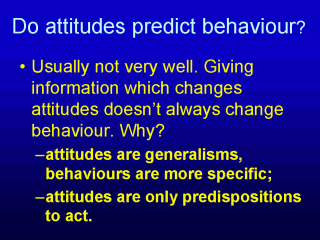| front |1 |2 |3 |4 |5 |6 |7 |8 |9 |10 |11 |12 |13 |14 |15 |16 |17 |18 |19 |20 |21 |22 |23 |24 |25 |26 |27 |28 |29 |review |
 |
So, do attitudes do a better job
of predicting behaviour? Well, a bit better. But it can be notoriously difficult to change
peoples’ attitudes. When you give information which changes attitudes, it doesn’t
always change behaviour. This is because attitudes are not motivations, but they are
general perspectives or orientations that people hold. While they may predispose you to
behave in a certain way, say to vote for rather than against something, in themselves they
only give a predisposition, not activation. Behaviours are more specific acts. Numerous attempts to link behaviour change to attitude change have produced mixed results. Again, what we can say is that a change of attitude is often a precursor to behaviour change, but is not a guarantee of such change. Behaviour change itself will often lead to attitude change as much as will attitude change to behaviour change. In fact, much more research supports the notion that by changing behaviour it is easier to change attitude, than the other way around. However, because people cannot really be coerced into changing their behaviour to improve their health, this is seldom done. When it is, such as with laws demanding the use of seat belts in cars, attitude change often follows. But not always. Prohibition of alcohol use in the USA in 1919-1929 lead to underground drinking dens, while attempts to ban certain activities, such as religious practice in China have not been successful at changing many peoples’ attitudes towards religion. |